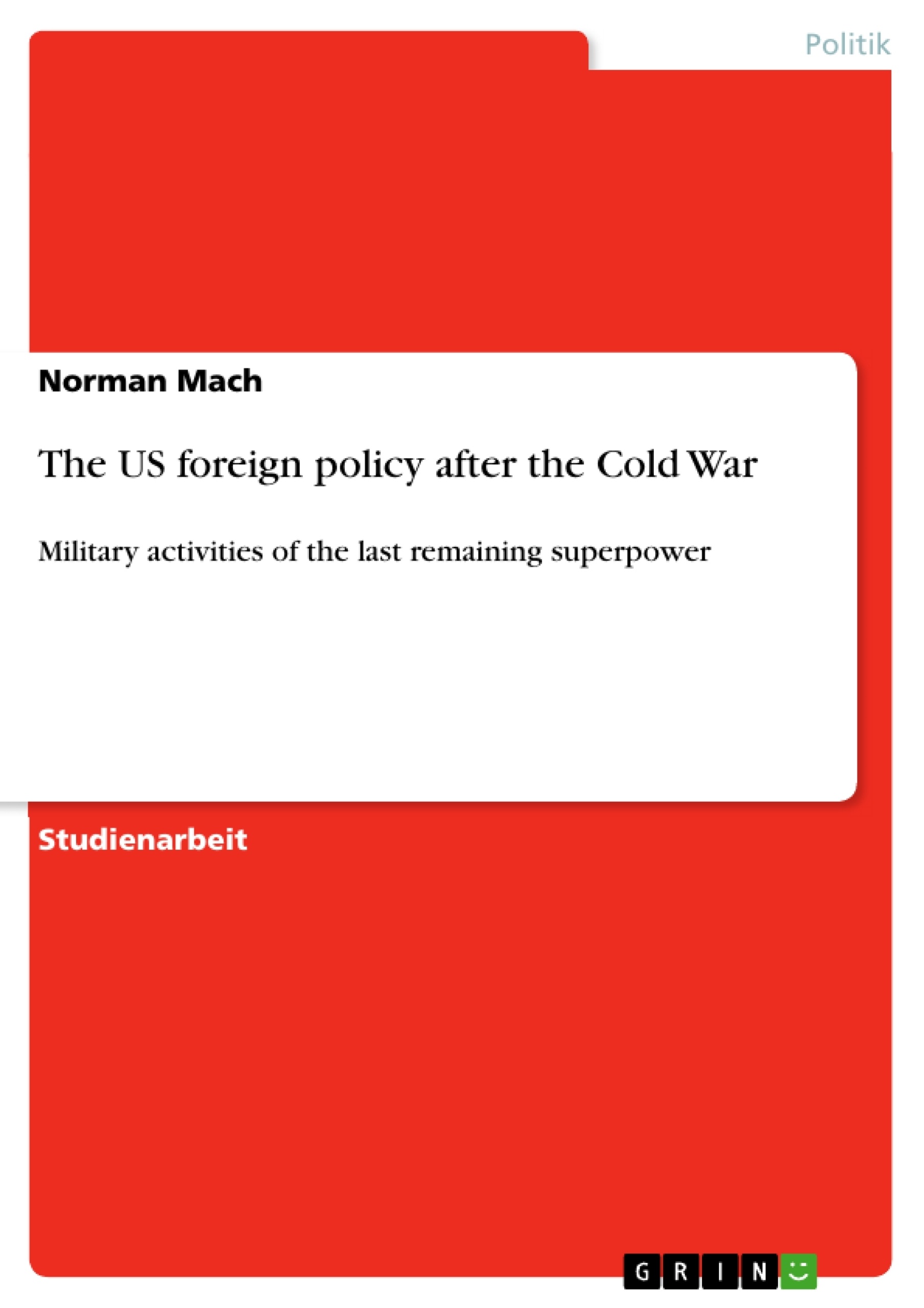After the end of the Soviet Union were only the USA left as an international superpower - a big player. But even with such a massive amount of power it is not possible for the USA to address all challenges at the international area alone at an unilateralism way. It needs multilateralistic structures. But in the past 20 years was the last remaining superpower in a struggle between unilateralism and multilateralism.
The main goal of the US foreign policy is the defence of the US sovereignty. US norms, standards and laws should take precedence over foreign or internationally promoted ones. It is part of the unilateralism, which is shown by the USA. The changing foreign policy between the democratic and republican presidents, like Bill Clinton and George W. Bush, and the majority in congress is part of certain traditions within US foreign policy.
But Clinton and Bush, a democratic and a republican president, used military forces to reach their goals in their foreign policies. The following semester paper will state the Doctrines of the last three US-Presidents, the changes between unilateralism and multilateralism and how the presidents used the military power of the USA. The main question is, if the unilateralism of the Bush Doctrine is typically for the foreign policy in the 21st century or if it is getting closer to multilateralism nowadays.
Inhaltsverzeichnis
- I. Introduction
- II. Abbreviations
- III. The relation to the United Nations
- IV. The Clinton Doctrine
- V. The Bush Doctrine
- VI. The Obama Doctrine
- VII. Conclusion
Zielsetzung und Themenschwerpunkte
Diese Arbeit untersucht die US-Außenpolitik im Kontext der Nachkriegszeit und analysiert die verschiedenen Doktrinen der letzten drei US-Präsidenten, Clinton, Bush und Obama. Sie beleuchtet den Wandel zwischen unilateralen und multilateralen Ansätzen in der US-Außenpolitik und untersucht den Einsatz militärischer Gewalt durch die USA im Rahmen ihrer Außenpolitik. Die Arbeit befasst sich außerdem mit der Frage, ob die unilaterale Bush-Doktrin typisch für die US-Außenpolitik des 21. Jahrhunderts ist oder ob sich eine stärkere Hinwendung zum Multilateralismus abzeichnet.
- Die US-Außenpolitik im Kontext der Nachkriegszeit
- Die Doktrinen der US-Präsidenten Clinton, Bush und Obama
- Der Wandel zwischen unilateralen und multilateralen Ansätzen in der US-Außenpolitik
- Der Einsatz militärischer Gewalt durch die USA im Rahmen ihrer Außenpolitik
- Die Frage der typischen Ausrichtung der US-Außenpolitik im 21. Jahrhundert: Unilateralismus vs. Multilateralismus
Zusammenfassung der Kapitel
Kapitel I führt in die Thematik der US-Außenpolitik nach dem Ende des Kalten Krieges ein und stellt die zentralen Herausforderungen für die USA als einzig verbliebene Supermacht dar. Kapitel II bietet eine Übersicht über die im Text verwendeten Abkürzungen. Kapitel III beleuchtet die Beziehung zwischen den USA und den Vereinten Nationen, die durch Spannungen geprägt ist, und diskutiert die Rolle der USA im Sicherheitsrat, der Generalversammlung und dem Sekretariat der Vereinten Nationen.
Schlüsselwörter
US-Außenpolitik, Nachkriegszeit, Supermacht, Unilateralismus, Multilateralismus, Clinton-Doktrin, Bush-Doktrin, Obama-Doktrin, militärische Gewalt, Vereinte Nationen, Sicherheitsrat, Generalversammlung, Sekretariat, Jesse Helms, Terrorismus.
Häufig gestellte Fragen
Wie veränderte sich die US-Außenpolitik nach dem Kalten Krieg?
Nach dem Ende der Sowjetunion blieben die USA als einzige Supermacht zurück. Die Politik schwankte seither zwischen Unilateralismus (Alleingängen) und Multilateralismus (Zusammenarbeit mit Partnern wie der UN).
Was kennzeichnet die Bush-Doktrin?
Die Bush-Doktrin ist stark unilateral geprägt. Sie beinhaltet das Recht auf Präventivschläge gegen Terrorgefahren und betont die Verteidigung der US-Souveränität über internationale Normen.
Worin unterscheidet sich die Obama-Doktrin von der Bush-Ära?
Obama setzte verstärkt auf Multilateralismus und Diplomatie, auch wenn er militärische Mittel (z.B. Drohneneinsätze) weiterhin nutzte, um nationale Interessen zu wahren.
Wie war das Verhältnis von Bill Clinton zu den Vereinten Nationen?
Clinton verfolgte einen "assertive multilateralism", stieß jedoch im US-Kongress oft auf Widerstand, insbesondere bei der Finanzierung und Unterstellung von US-Truppen unter UN-Kommando.
Was ist das Hauptziel der US-Außenpolitik?
Das primäre Ziel ist die Verteidigung der nationalen Souveränität und Sicherheit. US-Gesetze und Standards sollen dabei in der Regel Vorrang vor internationalen Regelungen haben.
- Quote paper
- Norman Mach (Author), 2011, The US foreign policy after the Cold War , Munich, GRIN Verlag, https://www.hausarbeiten.de/document/174715


